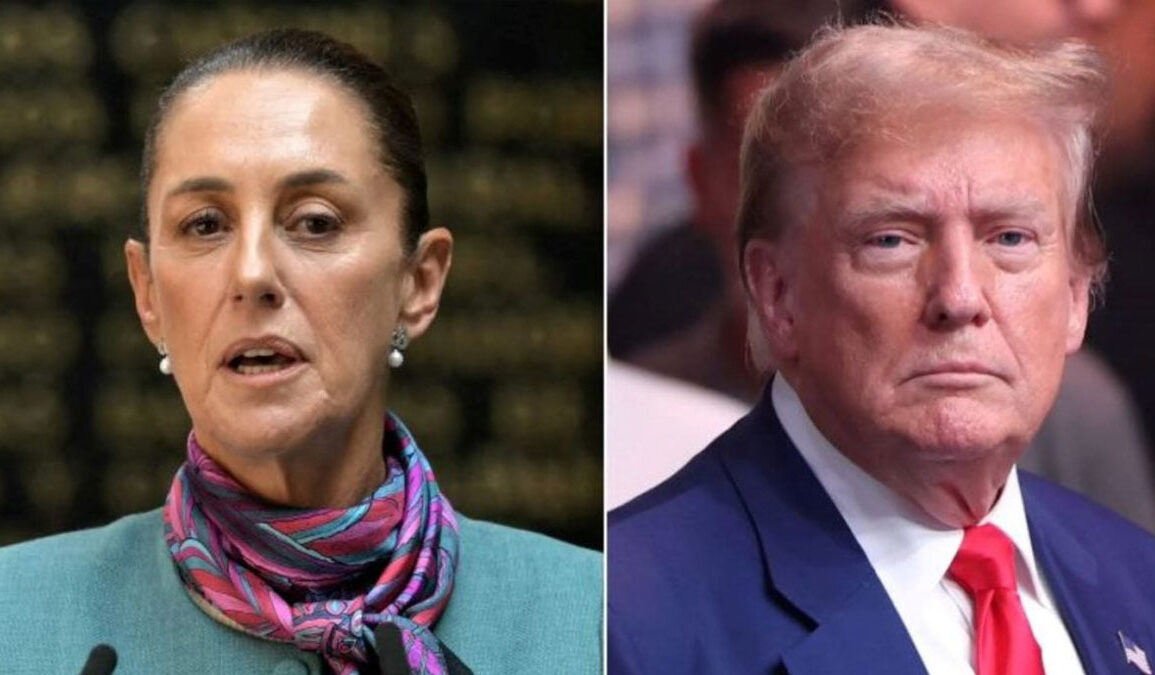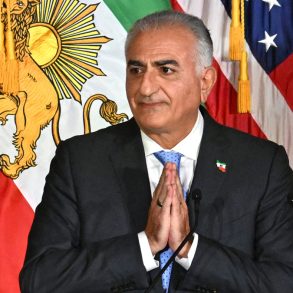Mexican President Claudia Sheinbaum is pushing back hard against President Donald Trump’s proposal for U.S. military strikes on cartel targets inside Mexico. Her refusal has sparked a wave of debate on both sides of the border, especially as critics question whether her stance is really about sovereignty or about avoiding a confrontation with criminal groups that many say already control large parts of the country.
Sheinbaum’s comments followed Trump’s statement Monday that he would be willing to authorize U.S. strikes inside Mexico to stop the flow of deadly drugs into the United States. Trump said it would be “OK with me” if this was what it took to protect American lives. He argued that such operations could save “millions of lives” and pointed to what he called major success in intercepting narcotics by sea. He said similar tactics could be used on land to disrupt cartel routes.
On Tuesday, Sheinbaum answered firmly. She said Mexico would not allow foreign military action within its borders under any circumstances. She explained that this was not a new issue and that Trump had floated similar ideas in previous discussions. She said, “It is not going to happen,” making her position clear.
Her comments added new fuel to growing tensions between Mexico and the United States over how to combat drug trafficking, border security, and the expanding power of criminal networks on both sides of the Rio Grande.
Sheinbaum insists that Mexico will not allow U.S. military forces to operate on Mexican soil. She explained that she had told both Trump and Secretary of State Marco Rubio that while Mexico welcomes intelligence sharing and technical cooperation, operational control must remain under Mexican authority. According to her, both U.S. officials “appeared to understand her position.”
She said, “We operate in our territory.” She stressed that Mexico’s sovereignty cannot be compromised, even in the face of rising cartel violence.
She also said that any security partnership with the United States must respect Mexico’s decision-making power. Her message was direct: cooperation is fine, but intervention is not.
Many critics in Mexico and the United States argue that Sheinbaum’s firm rejection of U.S. intervention raises deeper questions about her relationship with the cartels themselves. They suggest she may be either unwilling or unable to confront these groups because of their enormous power inside Mexico. Some believe she could be complicit, whether through political pressure, influence from officials who work with cartel interests, or even fear of retaliation from violent organizations that have targeted public figures before. To her critics, her resistance to outside action looks less like a defense of sovereignty and more like a sign that the cartels hold significant leverage over her government.
Trump’s Hard Line on Cartels
Trump has made it clear that he views the cartels as a national security threat to the United States. His proposal to launch strikes inside Mexico is part of a plan to stop the flow of fentanyl, methamphetamine, and other drugs that have fueled overdose deaths across America.
Trump said the United States had strong results intercepting drugs at sea and that similar operations could disrupt cartel logistics on land. He said he would do “whatever it takes” to protect Americans from the deadly impact of narcotics.
He also framed the issue as one of Mexican responsibility. Trump said he is “not happy with Mexico” when it comes to stopping drugs before they cross the border. His public pressure places Sheinbaum in a difficult position, as she must demonstrate that she can control the cartels while also avoiding any appearance of bending to Washington.
The cartels remain some of the most powerful and violent criminal networks in the world. They smuggle vast quantities of fentanyl and other narcotics into the United States. These operations have contributed to widespread addiction and tens of thousands of deaths every year. The U.S. government sees cartel activity as a direct threat to public health and national security.
Inside Mexico, the cartels are deeply entrenched. They operate in large parts of the country, charging taxes, controlling roads, and influencing local governments. Critics say they have become parallel power structures that the federal government has not effectively challenged.
Some of Sheinbaum’s opponents argue that her refusal to allow U.S. intervention benefits the cartels more than the Mexican people. They point out that she has not taken bold military steps against the cartels herself, raising questions about whether she can or will do so.
Confusion at the Border Adds to the Strain
The dispute intensified when individuals arrived by boat on a beach in northeastern Mexico and posted signs claiming the land belonged to the U.S. Department of Defense. The signs read “Warning: Restricted Area” in both English and Spanish and said the land was under U.S. military control.
Mexico’s Navy quickly removed the signs after determining the beach was on Mexican soil. Sheinbaum said that the signs were placed by contractors working for a U.S. government agency and that the shifting riverbed of the Rio Grande made the exact border hard to pinpoint in that area.
The witnesses said the signs were posted on Playa Bagdad, close to where the Rio Grande meets the Gulf of America. The location is near SpaceX’s Starbase launch site in Boca Chica, Texas. Sheinbaum has previously raised concerns about debris from a SpaceX explosion landing inside Mexico and said her government is investigating that issue.
The incident created speculation about whether it was an accidental misplacement, an unauthorized action, or a symbolic move connected to ongoing tensions.
This episode adds to a list of points of friction between Mexico and the United States. Earlier in the year, Trump ordered the Pentagon to designate a stretch of land on the border as a National Defense Area. The Department of Defense marked 110,000 acres as restricted land at Trump’s request.
Mexico also strongly opposed Trump’s directive to rename the Gulf of Mexico as the Gulf of America. For Mexico, this was another sign that the United States was asserting itself in ways that could undermine Mexican identity and territorial pride.
These actions, combined with Trump’s proposal for military strikes, deepen questions about how far the United States is prepared to go in its effort to stop cartel activity.
Supporters of Sheinbaum argue that any U.S. military action would violate international law, put civilians at risk, and could trigger a dangerous conflict. They say the solution should rely on joint intelligence, better policing, and increased cooperation, not military strikes.
Observers note that Sheinbaum’s government has not introduced major new initiatives to counter cartel power. They argue that her insistence on sovereignty does not answer the deeper question of how Mexico plans to regain control of territory dominated by criminal groups.
Both nations face tremendous pressure. The United States wants immediate action to stop the drug flow. Mexico wants to protect its sovereignty. Meanwhile, the cartels continue to grow in strength and influence.
Sheinbaum’s refusal leaves many questions unanswered. She has defended Mexico’s independence, but she has not laid out a comprehensive plan for confronting the cartels. Trump’s statements show a willingness to escalate pressure if Mexico does not act decisively.
NP Editor: Trump knows that Mexico is essentially a narco-empire and Sheinbaum will be personally under threat if the U.S. is allowed to attack the cartels. He has put this on the table, which may serve to expose this situation. Will it go further? Nobody knows yet.








